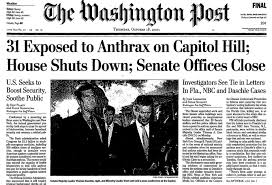Russell Welch
(policeman, whistleblower) | |
|---|---|
 | |
| Born | 21 November 1947 Sonora, California |
| Died | 31 October 2020 (Age 72) |
| Nationality | US |
| Alma mater | Humboldt State University, San Francisco State University |
| Victim of | Anthrax |
| Interests | • Mena • 2001 Anthrax attacks |
Whistleblower investigator for the Arkansas State Police who was exposed to weaponized anthrax | |
Russell Welch was an investigator for the Arkansas State Police who in the late 1980s and early 1990s had been trying to blow the whistle on the massive cocaine smuggling scandal unfolding in front of him in Mena, Arkansas.
In 1991, he was exposed to weaponized anthrax when he opened a letter which released electrostatically charged floating spores in his face, an incident with a conspicuous similarity to the 2001 Anthrax attacks.[1] He recovered, but suffered kidney damage from the medicine and had scars on his face.
Background
Russell Welch was born November 21, 1947 in Sonora, California. He graduated high school in Crescent City, CA in 1965, and joined the Army. Welch was an Army Medic in 1 tour in Vietnam 1965-68. In his civilian life, he went to college at Humboldt State University and San Francisco State University where he obtained his bachelor’s in science and his Masters in English. Russell then went on to teach at Santa Rosa College.[2]
Arkansas
Welch came to Mena, Arkansas in 1973 and was an EMT and a Paramedic for the Ambulance Service. From 1974 to 1976 he was a Polk County Deputy Sheriff under Corky Callahan and Al Hadaway. In 1976 he joined the Arkansas State Police where he worked for 20 years as a criminal investigator until he retired as a Corporal in 1996. [2]
Anthrax poisoning
On the weekend of September 21, 1991, Welch met with IRS Investigator Bill Duncan to write a report on their investigation of Mena drug smuggling and money laundering and send it to Iran-Contra prosecutor Lawrence Walsh. Welch had just opened a case concerning the theft of sexually explicit photographs which could have been used to blackmail state officials. On Friday, September 20, Welch went to one of the prisons near Pine Bluff and interviewed the person who had actually taken the photographs, a person whose best friend was very close to Barry Seal. The next morning, Saturday, he and his wife, Debbie Welch, made the three-hour drive to Little Rock.[3]
Returning to Mena on Sunday, Welch told his wife that he didn't feel too well. He thought he had gotten the flu. Monday the symptoms were worse. By Tuesday Welch was certain that he had a serious case of pneumonia. He had had pneumonia before and recognized the symptoms. Tuesday night he could hardly walk and his wife took him to the local hospital. The doctor gave him some over-the-counter cold tablets and sent him home.
But, Welch's condition deteriorated further to the point where his wife took him to another doctor in Mena the next day. Dr. Calleton, a Vietnam vet, immediately called the Centers for Disease Control in Atlanta and told Welch's wife to get him to Fort Smith immediately. The doctor told her that he should go by ambulance but she might be able to get there faster if she left right then. He called the CDC one more time before they left. In Fort Smith a team of doctors were waiting. Dr. Calleton had called them twice while Welch was in transport and they had been in contact with the CDC. Later the doctor would tell Welch's wife that he was on the edge of death. He would not have made it through the night had he not been in the hospital. He was having fever seizures by now.[3]

A couple of days after Welch had been admitted to St. Edwards Mercy Hospital, his doctor was wheeling him to one of the labs for testing when she asked him if he was doing anything at work that was particularly dangerous. He told her that he had been a cop for about 15 years and that danger was probably inherent with the job description. She told Welch that they believed he had anthrax. She said the anthrax was the military kind that is used as an agent of biological warfare and that it was induced. Somebody had deliberately infected him. She added that they had many more test to run but they had already started treating him for anthrax. [3]
The next day, in the hospital room, the doctor told Debbie Welch that they believed her husband had military anthrax and they were going to treat him for it.[3]T
The following day Arkansas State Police Investigator Andy Wiley was in Welch's room and heard the doctor repeat the diagnosis. his time Welch told the doctor that he read about an outbreak of anthrax in some cattle in southeastern Arkansas a couple of weeks earlier. The doctor told Welch and his visitors that the warfare biological agent is not the same as the cow disease. She shook her finger in Welch's face and said emphatically, "No, somebody did this to you. Somebody sprayed you in the face." She described how the infectious agent is carried in canisters. She said, "This is the same stuff that Saddam Hussein was going to use on our troops." Investigator Wiley wrote down the names of Welch's medication and later confirmed that he was, in fact, being treated for anthrax. Other state police officers went to the hospital room, periodically, to help Debbie Welch, who stayed in the private room with her husband day and night for the entire 14 days that Welch was hospitalized. Investigator Charles Lambert and Investigator Bobby Walker were among those that heard the doctor discuss Welch's circumstances and the anthrax. [3]
After this incident, Welch spent time trying to figure out how he could have gotten the anthrax. One possibility, he finally concluded, was through envelopes carrying padding material in which the infectious agent, Bacillus anthracis, can be transmitted. The Arkansas State Police used these for a while to mail microcassette tapes containing investigator's dictation. Welch's padded envelopes were returned to him with the tops torn off. When he complained to the secretary, Kim McBride, in Hope, Arkansas, she told him that the padded envelopes were not torn when she mailed them. Welch told his supervisor, Lt. Finis Duvall. Rather than do an investigation to find out who was tampering with official state police mail, some of which was sensitive, Lt. Duvall just said, "Well, I'll be damn... wonder who's doing that." [3]
A Document by Russell Welch
| Title | Document type | Publication date | Subject(s) |
|---|---|---|---|
| Document:There was a prosecutable case in Arkansas | article | 15 December 2016 | Mena Barry Seal Del Hahn |